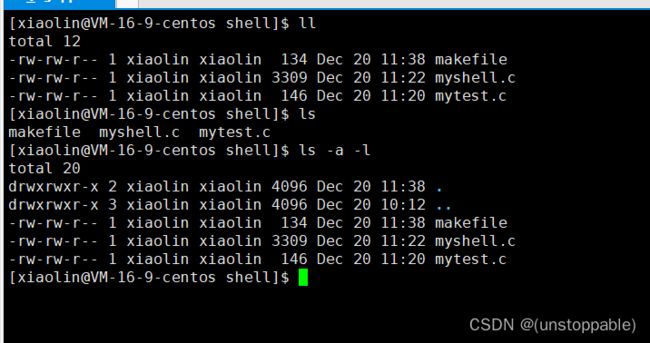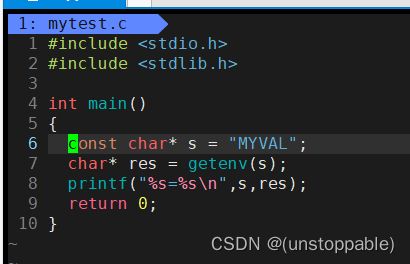【lesson17】minishell(shell的模拟实现)
文章目录
- 模拟实现shell的思路
- 具体实现
-
- 一直循环(一)
- 显示提示行符(二)
- 获取用户输入的字符串(三)
- 对字符串进行解析(四)
- 创建子进程执行指令(5)
- 细节问题解决
-
- 问题一
- 问题二
- 问题三
- 问题四
- 代码
-
- myshell.c
- mytest.c
模拟实现shell的思路
1.首先shell一定是一直循环在运行的,不然我们无法一直读取指令。
Xshell的演示:

我们也看到Xshell也一直在等待,命令的输入,有命令输入则执行命令,无则一直循环等待。
我们会看到Xshell一直会显示一串括号内的提示符给我们
3.然后是获取用户输入的字符串

要执行OS的指令,首先我们要从键盘中读取出该指令,然后才能谈之后的事。
4.对字符串进行解析
我们从键盘中读取出来的指令是一串字符串,而我们要执行的指令是分开的一个一个的字符串,所以要对读取上来的字符串进行解析。
5.创建子进程执行指令。
为什么要创建子进程执行指令呢?
因为子进程执行指令的时候如果因为指令而引发崩溃等问题就不会影响到父进程,而父进程只要聚焦于读取数据,解析数据和派发任务即可。

我们可以看到真实的Xshell也是如此的。执行一个不存在的指令出错。但是不会影响Xshell的使用
具体实现
一直循环(一)
显示提示行符(二)

但是这里会有一个问题

我们会看到当我们运行自己的shell的时候会发现光标是在下一行的,而不是跟在提示行符后面的,我们看一下正常Xshell。

我们可以看到正常Xshell光标是跟在,提示行符后面的。
那么是因为什么呢?
其实很早之前在进度条代码的实现就讲过了,是==\n的问题==,具体细节这里就不过多介绍。
获取用户输入的字符串(三)
1.首先我们要定义一个全局数据,用来保存获取的数据。

加粗样式2.其次是对cmd_line数组初始化

3.用fgets函数从stdin(标准输入)中读取数据。因为shell是也一直运行的,命令会一直被输入,所以fgets函数也要一直读取数据。

对字符串进行解析(四)
因为读取读取上来的是一组字符串,所以要对该字符串进行解析。
1.首先要创建命令数组,保存解析后的命令。

2.开始解析字符串
我们可以用strtok函数来解析字符串
因为我们输入命令的时候,使用空格隔开的,所以解析命令的时候,也要按照空额解析出来。
先定义空格

开始解析

strtok函数,第一次解析某个字符串要传入该字符串,接下来如果还是解析该字符串可以不用传,直接穿个NULL即可。
strtok返回值问题:
strtok解析字符串是一个一个解析的,解析完返回解析的字符子串。
演示:

创建子进程执行指令(5)
上面子进程用进程替换执行指令,这里如果有问题的话,大家请移步进行替换的博客。
到这一步基本已经可以了。但是还有一些细节性的问题需要解决。
细节问题解决
问题一

我们在运行ls的时候会发现,系统的ls会带颜色,而我们自己代码执行的ls不会带颜色。
这是因为系统的ls是别名。
![]()
所以我们碰到ls指令要特别处理,其实多传个颜色即可。


问题二

从图中我们会发现,我们自己的ll指令无法执行,因为系统中ll指令也是别名。

而我们也特殊处理。


问题三

我们从图中可以看到cd不会改变路径的,但是正常的shell cd指令是要改变路径的,这里为什么没有改变呢?
因为是子进程在执行命令,而父进程只分析命令等,所以子进程的路径发生了改变,但是父进程的路径并没有发生改变。
问题四
首先我们建一个程序查找自己用我们的程序输入的环境变量。


我们会发现shell不允许我们自己的程序使用export。
所以对export指令我们也要单独处理。

但是这里有个非常隐蔽的问题。

我们会发现我们处理的第一步,就是给要输入的环境变量重新放一个地方。
因为我们自己的程序,在export结束后,就会清空g_argv数组的数据,而export不是直接把数据放进环境变量中的,是将指向该数据的指针放进环境变量中。所以当我们要查找该环境变量的时候就会发现什么都没有。
演示:

所以我们要创建一个数组将其保存起来。
但是这里也没有彻底解决这个问题,因为当再次export的时候,旧的export数据就有被覆盖,从而找不到。
演示:

代码
myshell.c
#include mytest.c
#include 







